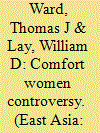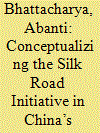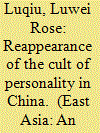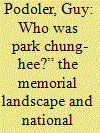|
|
|
Sort Order |
|
|
|
Items / Page
|
|
|
|
|
|
|
| Srl | Item |
| 1 |
ID:
149642


|
|
|
|
|
| Summary/Abstract |
During the World War II, up to 200,000 women, the majority of whom were Korean, were forced to provide sex to Japan’s military forces. The perceived refusal of Japan to fully take responsibility for the mistreatment of these “comfort women” has been a major obstacle to Japanese-Korean relations for a quarter of a century. Although the signing of the December 28, 2015 Agreement between Japan and Korea purported to “finally and irreversibly” solve the comfort women issue that has divided these two East Asian powers, the voices of Korean and Korean-American civil society indicate the contrary. American local, county, and state governments have become key battlegrounds in the conflict. As comfort women memorials across the USA proliferate, these governmental entities have allowed themselves to be caught up in incomplete narratives, whether Japanese or Korean. Against the backdrop of the tense geopolitics of today’s Asia-Pacific, a more responsible, comprehensive inquiry is needed to bring closure to a tragic chapter of human history.
|
|
|
|
|
|
|
|
|
|
|
|
|
|
|
|
| 2 |
ID:
149645


|
|
|
|
|
| Summary/Abstract |
While the Silk Route Initiative (SRI) appears to be a novel foreign policy strategy under Xi Jinping’s leadership, it is integral to China’s periphery policy (zhoubian zhengce). Arguably, periphery policy is rooted in the Chinese imperial history and has remained a salient aspect of state formation and foreign policymaking of the post-1949 China. Under Xi Jinping, it has acquired a preeminent foreign policy goal. This study puts the SRI in a historical framework and argues for the centrality of periphery in China’s domestic and foreign policy. Looking at the SRI from the prism of periphery, while suggesting an essential continuity in Chinese foreign policy and strategic thinking, also indicates that periphery is not simply a frontier strategy. Rather, it encompasses the whole gamut of Chinese domestic and foreign policy. Embedded thus in the periphery policy, the SRI is a well thought-out Chinese grand strategy to reclaim its geopolitical dominance in Asia and fulfill the goal of “China dream.” This strategy, in effect, challenges the US dominance and de-centers it from Asia and helps China to create a Chinese-centered order in Asia and beyond.
|
|
|
|
|
|
|
|
|
|
|
|
|
|
|
|
| 3 |
ID:
149644


|
|
|
|
|
| Summary/Abstract |
Over the past 2 years, there have been signs that the Chinese Communist Party has activated the propaganda machine to build a cult of personality around the current leader: Xi Jinping. The campaign has global ambitions. This study analyzes Chinese state media news stories, music videos, and animation on social media to discuss the themes of rhetoric and ritual. Using firsthand observation along with a brief comparison of the Soviet Union system and the history of the Communist Party of China (CPC), this study provides details on how the CPC is attempting to produce a cult of personality and the constraints it faces in doing so. Understanding this process is important for understanding the CPC and predicting whether China will continue to experience personalized regimes in the future.
|
|
|
|
|
|
|
|
|
|
|
|
|
|
|
|
| 4 |
ID:
149643


|
|
|
|
|
| Summary/Abstract |
President Park Chung-hee played a predominant role in shaping South Korean history, yet he remains a controversial figure. This paper explores the way this controversy has manifested itself in the memorial landscape and its significance within the context of national identity politics. It is argued that the debate between conservatives and progressives over the memory of Park has complicated the discourse beyond the prevalent focus on ethnic nationalism. The increasing place allocated for Park in the memorial landscape since 2008 is a tangible manifestation of a memory boom that appeared a decade earlier. Thus, the creation of an encouraging atmosphere in this regard can explain the correlation between the establishment of consecutive conservative governments and said trend. The way the memorial landscape has changed has offered an opportunity to think about a form of national identity which is more intricate. However, with the socio-political camps entrenched in their respective positions, the high-profile controversy has reflected the competing agendas and the degree to which the two sides differ on the fundamental components of national identity. The controversy over the memory of Park has thus both reinforced the divide between the political camps and demonstrated the extent to which it is deep.
|
|
|
|
|
|
|
|
|
|
|
|
|
|
|
|
|
|
|
|
|